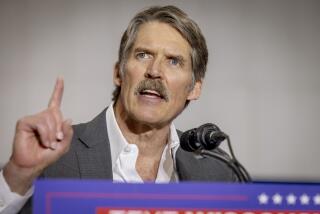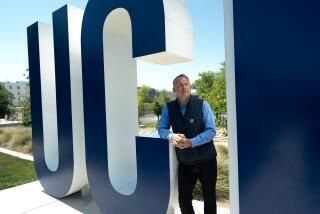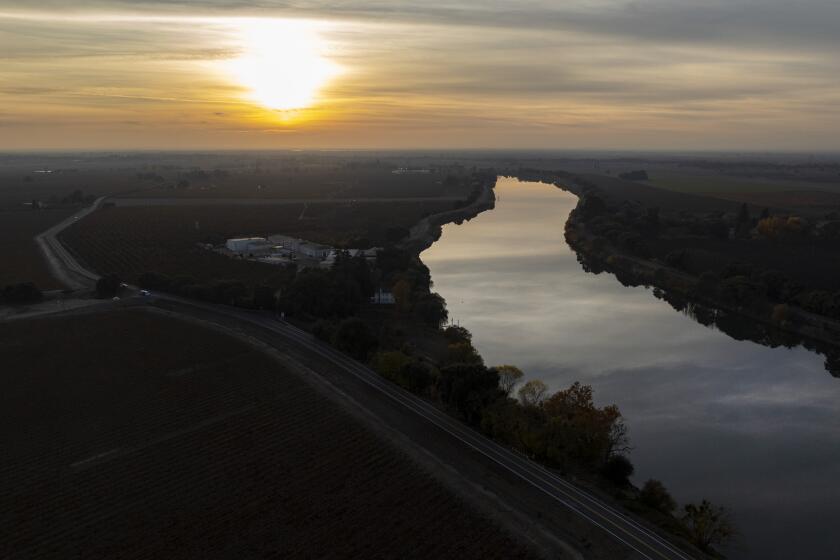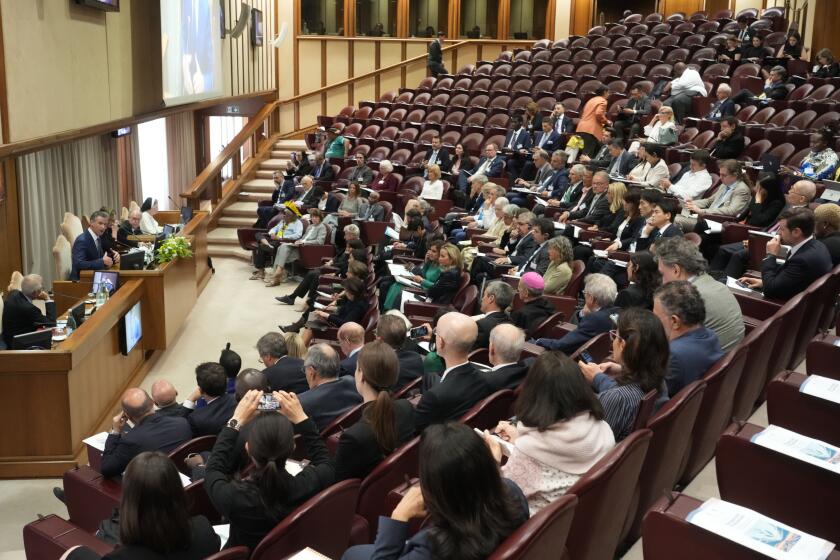Insurance Commissioner Race Focuses on Industry Donations
Two years after scandal drove former Insurance Commissioner Chuck Quackenbush from office, the insurance industry is trying to pick his successor, pouring more than $1.5 million into the campaign of Assemblyman Tom Calderon, the only candidate willing to take its money.
The same companies that became embroiled in the scandal that eventually forced Quackenbush to resign have contributed heavily to Calderon, each pumping thousands into his election effort through their agents and political action committees.
The huge infusion of industry dollars has made the two-term assemblyman from Montebello the odds-on favorite in the Democratic primary and turned the contest into a vitriolic slugfest between Calderon and two formidable opponents, Tom Umberg and John Garamendi.
Both Garamendi and Umberg borrowed liberally to raise enough money to match Calderon on the airwaves.
“The overriding issue in this race is who can best restore integrity to the Department of Insurance,” Umberg said. “All three of us are telling the voters, ‘I can.’”
On television the three political veterans use a soft sell. Umberg plays up his service as a colonel in the Army Reserves, hoping to capitalize on the patriotism engendered by the Sept. 11 attacks. Calderon presents himself as the man who will best protect Joe Consumer. Garamendi, the state’s first elected commissioner, tells viewers that he transformed the office into a consumer protection agency only to see it sullied by Quackenbush.
Rhetoric Gets Ugly on Campaign Trail
But on the campaign trail the rhetoric is ugly. Calderon bears the brunt as he is attacked repeatedly for accepting industry contributions. Even the underfinanced, lesser-known Democratic candidate in the race, Los Angeles attorney William Winslow, gets in a few licks.
“We need somebody who is willing to stand up to corporate abuse, unfairness and lawlessness,” Winslow tells a San Francisco radio audience, “and I don’t think it’s realistic to think you can do that if you take big contributions from insurance companies.”
As the race stretches into its final days, Calderon is being forced to explain the industry contributions that account for nearly 60% of the $2.47 million he has collected. Among his biggest contributors are those connected with the Quackenbush debacle. From Farmers Insurance and its agents Calderon got $180,404; 21st Century, $200,000; Allstate Insurance, $70,000; agents for State Farm, $34,400; and Fireman’s Fund, $20,200.
From Mercury Insurance, a company that was not caught up in the scandal but did sponsor legislation carried by Calderon, the assemblyman collected $150,000. Keith Parker, an investment partner of the company’s president, donated an additional $100,000.
Despite the donations, Calderon insists that the consumer is his first consideration. “This job was created ... to protect the consumer, and if you’re an insurance company and you sign a contract, I’m going to hold you to it. Period,” he said.
Industry officials say they gave to Calderon because they believe he will be fair. “He has proven he can balance the interests of both insurance consumers and the industry,” said Mary K. Flynn, Farmers’ media relations manager.
For Umberg, an attorney and former legislator, and Garamendi, a five-time candidate for statewide office, the strategy is to sell themselves on television and use news conferences, debates and interviews to hammer away at the contribution issue.
“It’s not going to remain a dirty little secret,” Garamendi said earlier this month. “I’m going to do everything I can in the remaining weeks of this campaign to make Calderon’s campaign contributions an issue.”
Calderon, who has spent $45,000 on researching his opponents, accuses Umberg and Garamendi of duplicity. What about the big donations Umberg accepted from Indian gaming interests in an unsuccessful race for attorney general, a job that would require him to give legal advice on Indian compacts? And what of Garamendi’s promise in 1990 not to accept insurance money, only to be broken when he asked the industry for contributions to pay off debts from a failed governor’s campaign?
Calderon said Garamendi and Umberg have their own explaining to do--Garamendi about his handling of the 1991 Executive Life Insurance Co. insolvency and Umberg about the $243,000 he collected from lawyers who sue insurance companies.
“If you look at how Garamendi and Umberg are funding their campaigns, it’s all rich friends and rich relatives,” Calderon said. “I don’t have any rich friends who can loan me money. “
In past years it got scant attention, but this year the insurance commissioner contest is high-profile, riding the wave of publicity generated by the actions of Quackenbush.
The attention comes at a critical time. The next insurance regulator will take office as the industry is still reeling from Sept. 11 and facing demands for payouts. He will inherit a crisis in the workers’ compensation industry, where coverage for injured workers is threatened by a string of insolvencies. He will have to decide numerous requests for rate increases from companies that were flush with investment earnings during the highflying 1990s but now contend that their reserves have fallen.
“Of all the statewide offices that are up this year, outside of governor, the insurance commissioner is the most important,” said state Senate Insurance Committee Chairwoman Jackie Speier (D-Hillsborough). “If there ever was a time when we needed someone in office who had their pulse on protecting the consumer, it’s now.”
Quackenbush Favorite Foil for the Candidates
For all the candidates, the favorite foil is Quackenbush, the twice-elected Republican insurance commissioner who made secret agreements with insurance companies that required them to donate to a private foundation he created. In return, Quackenbush agreed not to examine their handling of Northridge earthquake claims. Funds from the foundation were then used to buy commercials that could improve his name recognition for a possible governor’s race.
Calderon reminds voters that he was on the Assembly committee that uncovered Quackenbush’s conflicts.
Garamendi calls Quackenbush the inspiration for his candidacy because he wants to restore the consumer protections he says Quackenbush dismantled.
Umberg pledges to abide by an ethics code posted on his Web site, which he says will ensure that the excesses of Quackenbush will never be repeated.
Umberg and Garamendi label Calderon another Quackenbush because of his acceptance of industry contributions. Calderon maintains that, like Quackenbush, Garamendi is tainted by scandal.
Garamendi has been accused in two lawsuits of breaching his responsibility to Executive Life policyholders when he sold the insurance business to a French bank that used fronts to skirt American law. He also sold off assets of the company at a time when they were undervalued. They later brought billions of dollars in profits to their buyers.
Garamendi, who maintains that he never knew of the bank’s use of fronts, has contended that he had no choice but to sell in order to preserve as much of the assets as possible during a period of economic turbulence. He said that, as a result, 92% of policyholders got 100% of their contract. Executive Life activist Maureen Marr, however, contends that Garamendi’s actions resulted in a $4.7-billion shortfall in account values, causing policyholders to suffer huge losses.
While the Democrats battle it out, the Republicans conduct a primary that is gentlemanly by contrast. With no money for television, they vie for endorsements from Republican organizations. The candidates include Gary Mendoza, a Los Angeles lawyer and former director of the California Department of Corporations; Wes Bannister, an insurance broker; and Stefan “Watchdog” Stitch, an insurance auditor who legally changed his middle name to Watchdog so he could use it on the ballot.
More to Read
Get the L.A. Times Politics newsletter
Deeply reported insights into legislation, politics and policy from Sacramento, Washington and beyond. In your inbox three times per week.
You may occasionally receive promotional content from the Los Angeles Times.






